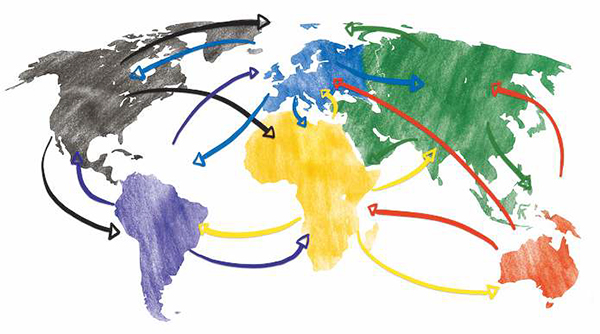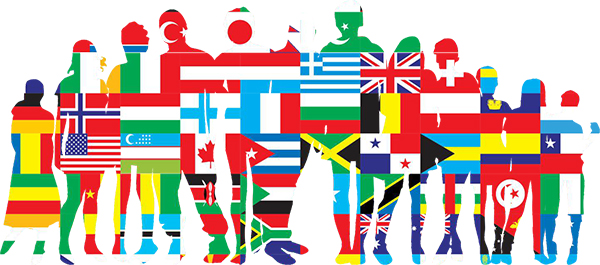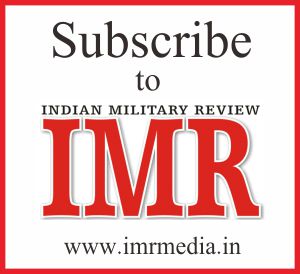“We intend to be kind to everyone. We have many friends. But just as importantly, we aspire to remain ourselves.” Lee Kuan Yen, Prime Minister of Singapore
A new global governance ahead
The effects of globalisation are radically challenging our perception of the world. In order to respond effectively to current challenges, we must change our mindset, open up to the world, consider those around us and create a new global governance.
The geopolitical transition is underway. China is not only an economic powerhouse, but also a global geopolitical force. Meant to revitalise the “Silk Roads”, the Belt and Road Initiative (BRI) aims to control the strategic space in which world trade occurs. Inevitably, BRI is meant to shape future global trade routes, and whoever controls these routes will control the world.
US President Donald Trump is pursuing a policy to protect American interests. His “America first” strategy is challenging global governance as we know it. It is revealing, in various ways, the world’s “unpaid bills”, especially Europe’s.
The persistent institutional crisis within Europe follows the same logic. Created in the aftermath of the Second World War, the European Union is now divided, mainly about refugee flows, BRI, Chinese investments in Europe, and Brexit, to name a few issues.
It is, therefore, essential to consider the problem’s origins while avoiding ad hoc or, even worse, simplistic solutions, such as those advocated daily by populists on social networks. Thus, we must reset our mindset and have the audacity and imagination to create a new global governance – one that is fairer, more equitable and more responsive not only to current challenges, but to the needs of all humanity:
• Identities and borders: How can the right to self-determination be respected and ensured without being divisive? How can we respect the sovereignty of states and territories without renouncing the positive effects of globalisation?
• How is it possible to manage Chinese power, power exerted by a country that does not share universal values – the values of the West, especially those of Europe and the United States? How can we integrate this geopolitical force (China), one which is based on an authoritarian capitalist system and which is expanding not only economically but also geographically? This means a China that is engaging in a conquest of space without making war in the classic sense of the term.
• Beyond borders: How can we integrate these two systems of opposing values into a new structure ensuring global cosmopolitical governance?
French geopolitics can provide us with part of the answer. It was Jacques Ancel (1879-1943) who added a very human concept – the identity of the heart – to geopolitical considerations. His concept is based on the need for balance and harmony within a society, country or region.
According to Ancel, “The border is a political isobar, which fixes, for a time, the balance between two pressures: the balance of masses, the balance of forces.” In the same spirit: “A solid nation, one in harmony, exists even without visible borders.”
Ancel placed the human being at the centre of his geopolitical considerations, i.e. man as creator. Thus, “human groups [are what] achieve a harmonious balance, ultimately recognising borders based on a common memory, history and language”. The result is “a nation of the heart in and of itself, non-rational.”
In search of a new balance
The characteristics of globalisation are ambivalent, even contradictory. Thanks to the Internet and digital technology, we are connected with each other to an ever-greater degree. We have access to many sources of information which provide us with seemingly endless facts and figures. The transparency and availability of information might increase, but knowledge and expertise do not necessarily follow suit.
At the same time, the world’s various actors are becoming both more interdependent and more competitive. Nation-states find themselves at odds with the transnational powers resulting from globalisation, such as global companies, economic and political associations and interest groups. All these transnational forces often act beyond the borders, rules and standards set by national laws. This cross-border activity requires greater strategic coordination between the various national and transnational actors. Yet, it is precisely the lack of coordination that causes not only a feeling of loss of control among the public, but also a general feeling of insecurity. Consequently, globalisation engenders an opening to the world, while simultaneously increasing the need to belong to a country or region. It is the need for identity, the need to remain ourselves in the whirlwind of globalisation.
This lack of foresight manifests as the chaos found within international organisations and institutions, which all emerged following the Second World War and which are now struggling to find adequate solutions to current challenges.
The current political storytelling has become obsolete.
Borders and their hallmarks
The process of transnationalisation and deterritorialisation inevitably brings us back to the issues of border, identity and nationality. Nationality is defined as the legal relationship between an individual and a country. It is obvious, even if it is difficult to admit: “Globalisation’s flows do not erase borders, countries, regions, territories or places.” On the contrary, the more connected the world is, the more the debate around borders is crucial in any geopolitical discussion. “[N]o natural borders, no closed physical domains that can close states, nations ad aeternum.”
According to Ancel, borders can be described using the “three Ps”: precarious, persistent and permeable. In addition, borders can be visible or invisible, for example when moving from an urban area to a maritime one.
Arbitrary borders and ‘borders of civilisation’
Ancel mainly differentiates between two types of border. On the one hand, there are the so-called arbitrary borders, which are tense and strategic, resulting from military claims. The treaties that delineate these borders are temporal and purely based on the national interests of the states involved.
“Borders of civilisation”, on the other hand, are more permanent, since they are based on a memory, history and common language resulting from the balance achieved by a specific group of human beings. Such borders are “nevertheless more complicated, because they are subject to many political and commercial interpretations”. Even if commercial interpretations aim to “pave the way” and not to “enclose” as military interpretations do, “paving the way” also means, in our current world, a conquest, an expansion, sometimes using military means, into the territory of others.
BRI – a true opening of borders?
The positive effects of globalisation can largely be seen as “paving the way”. Even if BRI is based on a commercial justification, the new Silk Roads are nevertheless closely linked with the idea of geographic and, above all, geopolitical expansion. China’s geopolitical influence is growing, especially in the Eurasian region as a whole, a region which is currently of great strategic import. Thus, BRI is part of China’s security strategy and is developing considerable geostrategic significance.
For years, China has been investing heavily in its military sector. Although the 7.5% increase in 2019 is less than the increase in 2018 (8.1%), the country plans to spend CNY1,190 billion, or €156 billion, to achieve Xi’s goal of having its armed forces “combat ready.”
The conquest of space without making war
Having already had a large army, especially in terms of manpower, China has now become a great naval force, a fact Westerners are only beginning to acclimate to, since, for them, China has traditionally been a weak country located very far away. BRI, the revival of the Silk Roads, is the counterpart to Trump’s “America first” policy. The initiative increasingly has military implications: “BRI will likely result in increased overseas access and presence for the People’s Liberation Army.”In addition, the majority of workers on BRI construction sites are Chinese and not members of the local workforce. As a result, the initiative is the manifestation of a “China first” policy, one that primarily pursues Chinese interests. The positive impact on countries in the BRI region is quite limited. Worse yet, these countries are becoming more dependent on China, playing the role of debtor to Beijing’s creditor.
In addition, China has skillfully bundled its civil and military interests under the rubric “security”, a concern that now determines its internal and external strategy. In 2017, the budget of the Ministry of the Interior even exceeded that of the Ministry of Defence by 19%. Preserving external security means safeguarding China’s sovereignty, while preserving internal security means ensuring internal stability and control by the Communist Party of China (CPC). Despite the apparent opening of its external borders, China is increasingly enclosing its population, especially through censorship – its invisible border.
The term “harmony” has acquired a special meaning since Xi came to power. He has been the CPC’s “president for life” since 2018. All civil, military and administrative power rests with him and he is pursuing a strategy to protect China’s internal and external interests. As a result, China is extending its borders without making war or conquering territory in the traditional sense of the word. Instead, it is conquering geostrategic space by expanding its geopolitical influence. In China, it seems there is no longer a state, there is only the Communist Party.
Solidity
In keeping with Jacques Ancel’s analysis, especially from the perspective of the “three Ps” – the persistence, precariousness and permeability of borders – developments such as “America first”, China’s Social Credit System, its Corporate Social Credit System, BRI and Brexit are all challenging the very concept of borders.
Faced by two superpowers, China and the United States, the EU is experiencing a full-blown identity crisis and finds itself confronted with a major strategic dilemma. “A solid nation in harmony exists even without visible borders.” Neither solid nor in harmony, the EU is being dragged into a false discussion on border reinforcement. The visible strengthening of borders does not address the root of the problem.
Opposing ideologies
China has introduced a new ideology derived from the notion of “harmony”, which is the key factor in its all-important internal and external strategy. As noted, the aim of BRI is not only to build up a huge network of commercial infrastructure in order to “develop wealth in the region and preserve peace, friendship and trust and understanding between different peoples”, as the CPC has expressed it. BRI is also an integral part of the Party’s plan for preserving national unity and internal stability. Harmony is China’s “leitmotiv”, its mantra while it pursues a policy of expansion, of conquest, geographically and geopolitically, without resorting to armed force.
Although less elegant, Donald Trump’s policy maintains the same logic: the return to national sovereignty, to protecting and defending national interests. The US government has renounced many policy and trade agreements in order to better protect its interest and to expand its sphere of influence. Stability and preserving unity, identity and sovereignty are the top priorities.
Thus, the balance of power, the field of engagement between the countries and actors is changing. Two systems with opposing values are facing off in a race for global leadership. The EU finds itself squarely in the centre of this field of engagement.
Conclusion: new “storytelling”
As noted, Ancel emphasises the human notion in his geopolitical approach. The important thing is to recognise and calmly accept the feeling of belonging to a country, to a region -accept, that is, the very natural need for identity. Such an identity ensures the political unity that would sustain the evolution towards a new Europe and, subsequently, towards a new global governance. A European identity must be cultivated, in addition to the various national identities. This European identity, moreover, can help define the objective interests shared by most member states.
Globalisation is forcing us to think and act in terms of geo-economics. Safeguarding economic interests has become imperative. The EU must build a political union of shared interests and must create strategic alliances as a result. The important thing is to build these alliances in the spirit of cooperation and not, as is the case in today’s world, in the spirit of competition. Facing today’s challenges is only possible in a spirit of cooperation and tolerance, especially since the ultimate goal is not only to improve our democratic processes, but to move humanity forward as well. According to Ancel, a border is “a political isobar, which fixes, for a time, the balance between two pressures: the balance of masses, the balance of forces.”In this spirit, we must change our global governance and, above all, our political narratives.
A new”storytelling” is required since today’s political practices and narrative strategies have lost their significance. The balance of power has changed radically. Neither the West nor China will alter its political system. It is therefore necessary to integrate China into the new global governance, even if it clearly does not adhere to our values.
Shared interests and common cosmopolitical standards must be defined in order to ensure social justice and greater equity, particularly in the distribution of natural resources, in order to effectively combat global poverty. Globalisation requires the establishment of more regulations, standards, laws and coordination between national and transnational forces.
The real problem does not stem from the issue of borders. Borders will always exist, even in the globalised world. “There are no problems with borders. There are only problems with nations.” It is important to tolerate and accept different national identities and lifestyles and, above all, to recognise that we all live in a world which requires more and not fewer regulations and laws.
Moreover, only the existence of a true European identity can ensure the necessary political unity for evolving towards a solid, harmonious Europe. By acting boldly, this new Europe can take the lead in establishing a new cosmopolitical governance. What is needed is a politically united Europe that asserts its shared objective interests and values by creating a space providing freedom and tolerance. Consequently, we must revitalise an idea advanced by Jacques Ancel: “We do not change borders except by force; we change our minds.”
Let us change our way of thinking.
(This article was first published in Modern Diplomacy on 13 Jan 2020)














